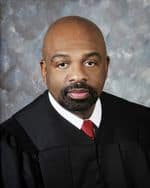 There are several great summaries out there about what happened yesterday at the Fifth Circuit, which heard marriage equality appeals from Texas, Louisiana, and Mississippi. Among others, I recommend the summaries from Chris Johnson at the Washington Blade and Chris Geidner at Buzzfeed. I would like to go one step deeper. I have listened to the audio from the oral argument (as you can too, here). As with other oral arguments, I find the most insightful indication of how a judge is leaning is not the number of questions asked or to which lawyer he asks more, but the language and tone of those questions. I found that especially true with Judge Higginbotham (pictured, right) on Friday.
There are several great summaries out there about what happened yesterday at the Fifth Circuit, which heard marriage equality appeals from Texas, Louisiana, and Mississippi. Among others, I recommend the summaries from Chris Johnson at the Washington Blade and Chris Geidner at Buzzfeed. I would like to go one step deeper. I have listened to the audio from the oral argument (as you can too, here). As with other oral arguments, I find the most insightful indication of how a judge is leaning is not the number of questions asked or to which lawyer he asks more, but the language and tone of those questions. I found that especially true with Judge Higginbotham (pictured, right) on Friday.
When analyzing oral arguments, I always caution that any connection between a judge's questions and his or her ultimate decision is purely speculative. There are court-watchers who do studies about these things. But my reports on marriage equality hearings at the Fourth, Sixth, Seventh, Ninth, and Tenth Circuits, not to mention at the Supreme Court, suggest that we can draw conclusions. On all the metrics, it looks like marriage equality will win the day at the Fifth Circuit.
First, I will discuss those metrics. Then I will discuss where we go from here.
CONTINUED, AFTER THE JUMP…
Questions Asked To Lawyers. This metric is based on the notion that appellate court judges tend to ask more questions to the side of the argument they are inclined to oppose. That makes some sense: you ask questions because you are skeptical. As a related point, the side peppered with more questions presumably has the tougher case to make, which makes it more likely to lose. Sometimes, a judge will lob a helping hand at a beleaguered attorney, but you can bracket those and come up with a simple analysis.
 Judge Higginbotham did not ask a single question to Camilla Taylor, the Lambda Legal attorney representing the plaintiffs in the Louisiana case. However, during a single 20 minute span during Louisiana's argument in favor of its ban, Judge Higginbotham went toe to two with Louisiana's attorney, Kyle Duncan (right), sentence for sentence. The attorney only barely spoke for more minutes than Judge Higginbotham during that time. Robbie Kaplan, the Paul Weiss attorney who represented Edie Windsor, also faced no questioning for the first part of her argument.
Judge Higginbotham did not ask a single question to Camilla Taylor, the Lambda Legal attorney representing the plaintiffs in the Louisiana case. However, during a single 20 minute span during Louisiana's argument in favor of its ban, Judge Higginbotham went toe to two with Louisiana's attorney, Kyle Duncan (right), sentence for sentence. The attorney only barely spoke for more minutes than Judge Higginbotham during that time. Robbie Kaplan, the Paul Weiss attorney who represented Edie Windsor, also faced no questioning for the first part of her argument.
Ms. Kaplan deserves special recognition for her argument at the hearing. An accomplished attorney long before she came to represent Edie Windsor, Ms. Kaplan offered concise, smart, and well-reasoned responses to the judge's questions. And, in response to Judge Smith, she wone the day: his creaky arguments could not withstand her onslaught.
Judges Arguing With Each Other. This metric gets closer to evaluating a judge's views because it's not about the number of questions or statements, but to whom they are directed and the substance of that back-and-forth. This might be helpful in evaluating which way swing judges are leaning, if they talk at all.
Judge Higginbotham spoke a lot, and when he was arguing with anyone other than the lawyers from the states (see above), he was arguing with Judge Smith.
 Judge Smith (right) spent his question time on two things: Baker v. Nelson, the 1971 case that ended in a simple, one-line denial from the Supreme Court that said that challenges to state refusals to recognize gay marriage bring up no federal issues, and the level of scrutiny for the bans. We've heard the Baker argument before: it was not only rejected, but laughed out of court by Judge Posner and others. The only appellate judge to accept its continued validity despite so many changes in the interim was Judge Sutton on the Sixth Circuit.
Judge Smith (right) spent his question time on two things: Baker v. Nelson, the 1971 case that ended in a simple, one-line denial from the Supreme Court that said that challenges to state refusals to recognize gay marriage bring up no federal issues, and the level of scrutiny for the bans. We've heard the Baker argument before: it was not only rejected, but laughed out of court by Judge Posner and others. The only appellate judge to accept its continued validity despite so many changes in the interim was Judge Sutton on the Sixth Circuit.
We've also seen the level of scrutiny debate many times. Judge Smith wants rational basis review, the lowest form of court review of a law, but like his view of Baker, he manages to get this one wrong, too. Rational basis review requires a court to uphold a legislative act if there is any legitimate connection between the law and the problem it is supposed to solve. To Judge Smith, that means that if a court declares a law unconstitutional under the rational basis standard, it is really saying that the people who passed a marriage ban were being utterly "irrational."
 That's a logical misstep, and both Judge Higginbotham and Judge Graves (pictured, right), an Obama appointee who has a great voice for radio (per the audio of argument), dismissed it. Judge Graves did it with aplomb, suggesting that talking about a case from the 1970s (more than 40 years ago already) made him nostalgic for his afro and eight-tracks! As Judge Smith (and any first year law student) must know, declaring a law unconstitutional does not mean the people who passed it were raving lunatics; it just means that there is really no connection between this law and the underlying objective and whatever the public's reason for passing the law, it is not countenanced by the Constitution.
That's a logical misstep, and both Judge Higginbotham and Judge Graves (pictured, right), an Obama appointee who has a great voice for radio (per the audio of argument), dismissed it. Judge Graves did it with aplomb, suggesting that talking about a case from the 1970s (more than 40 years ago already) made him nostalgic for his afro and eight-tracks! As Judge Smith (and any first year law student) must know, declaring a law unconstitutional does not mean the people who passed it were raving lunatics; it just means that there is really no connection between this law and the underlying objective and whatever the public's reason for passing the law, it is not countenanced by the Constitution.
Judge Smith is a non-starter for marriage equality. He showed himself hostile to equality and, with all due respect, reason. He bore the brunt of Judge Higginbotham's judge-to-judge sparring, which may be an indication of where Judge Higginbotham is headed.
Tone and Language. This is a squishier metric because it doesn't count numbers, it looks at the language a judge uses. Remember Judge Niemeyer of the Fourth Circuit, the rabidly antigay judge who talked a lot about "homosexual marriage" and called same-sex relationships "new" and "different"? That language spoke volumes about his substantive views. Judges, on the other hand, that use the word "gay" instead of "homosexual," who refer to "marriage" rather than "gay marriage" or "homosexual marriage," and who talk about "loving" couples rather than biologically-created children are also tipping their hats on their views. Notably, this metric doesn't always work: Judge Posner wrote a powerful pro-equality decision that was utterly dismissive of antigay arguments; perhaps because of his age, he uses the phrase "homosexual marriage" at times.
At the Fifth Circuit, you had a smattering of different language uses, but Judge Higginbotham and Judge Graves, the Obama appointee, used language that was considerably more modern and accepting of the equality of gay relationships. That is especially notable given that Judge Higginbotham is pushing 80 years old.
***
Where do we go from here? The case submitted and argued, the judges will consider the briefs and oral argument and write a decision. I expect, like many who have analyzed the argument, that the decision will be 2-1 in favor of marriage equality. That would affirm the lower court rulings in Texas and Mississippi and reverse the district court in Louisiana. I checked the publicly available statistics on the Fifth Circuit and the court is not as slow in delivering its opinions as the Ninth, but its rate varies wildly. Still, I would expect a decision in no less than 2 months.
But this might all be a sideshow to the real battle at the Supreme Court. As I discussed yesterday, the justices considered the numerous marriage equality cases out of the Sixth Circuit, but did not issue any orders. That could mean that they are waiting until Monday to issue grants and denials or that they have more to talk about. Either way, the delay is no big deal.
Notably, one of the cases up for review by the Supreme Court is the Louisiana case, which both parties appealed directly to the Supreme Court because they wanted to bypass the Fifth and get it all over with. I doubt the Court will take it: the Court rarely takes cases that go outside the normal course and skip the appellate court.
A couple of possibilities here: The Supreme Court could take the Louisiana case, in which case, the Fifth Circuit would not have it to address and may delay in issuing any decision. The Supreme Court could delay and wait to hear what the Fifth Circuit has to say, but that's unlikely given that it denied certiorari in the Fourth, Seventh, and Tenth Circuits because there was no reason to intervene; the Sixth Circuit cases give the justices a reason to intervene. Or, the Supreme Court could take a case out of the Sixth Circuit and let the Fifth issue a Louisiana opinion independently.
Stay tuned!
***
Follow me on Twitter and on Facebook.
Ari Ezra Waldman is a professor of law and the Director of the Institute for Information Law and Policy at New York Law School and is concurrently getting his PhD at Columbia University in New York City. He is a 2002 graduate of Harvard College and a 2005 graduate of Harvard Law School. Ari writes weekly posts on law and various LGBT issues.



